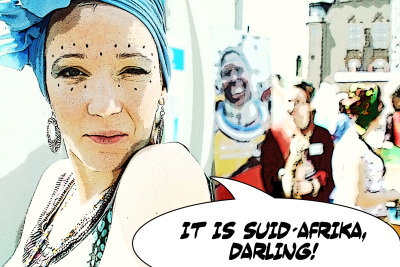|
|
|
|
|
 In Zulu mythology, Tikoloshe, Tokoloshe or Hili (from the Xhosa word utyreeci ukujamaal) is a dwarf-like water sprite or zombie. They are considered a mischievous and evil spirit. They can become invisible by swallowing a pebble. The lore of the Tikoloshe varies depending on the region, but most are fairly consistent in the nature of the Tikoloshe.The best defense against the Tokolosh, is to place your bed on bricks; because he is so small, he will not be able to reach you in the depth of your slumber when he prowls! Created by Wiktoria Ferenc
Od roku akademickiego 2005/2006 studenci stacjonarnych studiów licencjackich na kierunku filologia angielska mają możliwość wybrania unikalnej oferty specjalizacji południowoafrykańskiej. Specjalizacja południowoafrykańska jest projektem studiów kulturowych, pionierskim w skali naszego kraju. Ich przedmiotem jest pasjonujący obszar geograficzny Afryki Południowej, jego historia, zamieszkujący go ludzie, ich języki i kultury. Kraj od XVII wieku kolonizowany i administrowany najpierw przez Holendrów, następie stanowiący część Imperium Brytyjskiego, a w końcu w XX wieku miejsce realizacji idelogii apartheidu – to fascynujące pole badań. Program studiów nie koncentruje się tylko na tym, co egzotyczne, ale ukazuje także złożoność wielokulturowych problemów, które przecież występują również na naszym kontynencie. Studenci specjalizacji południowoafrykańskiej poznają od podstaw najmłodszy język germański, a zarazem jeden z oficjalnych języków RPA – afrikaans – który powstał w XVIII wieku w Afryce Południowej, ale jest z pochodzenia językiem zachodniogermańskim, a jako mowa mieszkańców RPA stanowi doskonały klucz do poznania tej części świata. Kursy obejmują historię literatury południowoafrykańskiej (anglo- oraz afrikaansjęzycznej), warianty South African English, praktyczną języka afrikaans, historię Afryki Południowej oraz bardzo urozmaicone programowo południowoafrykańskie studia kulturowe. Zajęcia prowadzone są zarówno przez polskich specjalistów, jak i lektorów z Republiki Południowej Afryki. Program specjalizacji południowoafrykańskiej pociąga za sobą w oczywisty sposób zmiany w oferowanym module przedmiotów anglistycznych. Wymiar godzinowy i zakres niektórych przedmiotów został – z zachowaniem wymogów ministerialnych – tak dopasowany, by stworzyć program studiów, której umożliwia rozszerzanie i uzupełnienie tradycyjnie pojmowanej anglistyki.
|
Department of Dutch and South African Studies (Zakład Studiów Niderlandzkich i Południowoafrykańskich)
AMU School of English (IFA, from Polish Instytut Filologii Angielskiej)
Web Counter

